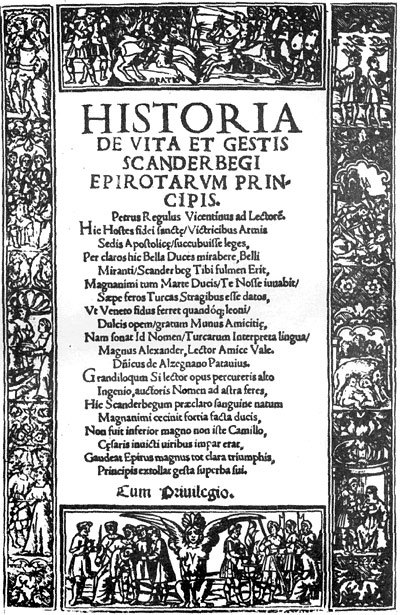|
Hasan Zyko Kamberi
Hasan Zyko Kamberi was a distinguished bejtexhi (bard) writer of Albanian literature. Overview He was born in the second half of the eighteenth century in Starje, a southern Albanian village near Kolonja at the foot of Mount Gramoz. All that is known of his life is that he took part in the Turkish-Austrian Battle of Smederevo on the Danube east of Belgrade in 1789 203 A.H.in an army under the command of Ali Pasha Tepelena (1741–1822). He died a dervish, according to Elsie no doubt of the Bektashi sect, in his native village at the beginning of the nineteenth century. According to Arshi Pipa, there is no evidence that Kamberi belonged to the Bektashi order of Sufism. His tomb in Starja was indeed turned into a Bektashi shrine known locally as the türbe of Baba Hasani. Kamberi is one of the most commanding representatives of the Muslim tradition in Albanian literature, though his main work, a 200-page mecmua (verse collection), has disappeared. A manuscript of this col ... [...More Info...] [...Related Items...] OR: [Wikipedia] [Google] [Baidu] |
Bejtexhi
The Bejtexhinj (in Albanian sing. ''bejtexhi'', pl. ''bejtexhinj''; from tr, beyte meaning "poem"), were popular bards of the Muslim tradition, literally meaning "couplet makers". It means the same in the Albanian literature, firstly muslim poets, that engaged in beit poetry. This genre of literature created in Albania in the 18th century that prevailed in different cities of what is now Albania, Kosovo, Chameria as well as in religious centers. The spread of Bejtexhinj was a product of two different significant factors. There was a demand in religious practices to write in Albanian and to free it from foreign influence. The other factor was the accretion of ideological pressure from Turkish rulers. The ruling Ottomans sought the submission of Albanians through the Muslim religion and culture. Albania rulers opened their own schools with many Bejtexhinj poets in attendance. History The Bejtexhinj wrote Albanian in the Elifba alphabet, an adaption of the Ottoman Turkish alpha ... [...More Info...] [...Related Items...] OR: [Wikipedia] [Google] [Baidu] |
Monastir, Macedonia
Bitola (; mk, Битола ) is a city in the southwestern part of North Macedonia. It is located in the southern part of the Pelagonia valley, surrounded by the Baba, Nidže, and Kajmakčalan mountain ranges, north of the Medžitlija-Níki border crossing with Greece. The city stands at an important junction connecting the south of the Adriatic Sea region with the Aegean Sea and Central Europe, and it is an administrative, cultural, industrial, commercial, and educational centre. It has been known since the Ottoman period as the "City of Consuls", since many European countries had consulates in Bitola. Bitola, known during the Ottoman Empire as Manastır or Monastir, is one of the oldest cities in North Macedonia. It was founded as Heraclea Lyncestis in the middle of the 4th century BC by Philip II of Macedon. The city was the last capital of the First Bulgarian Empire (1015-1018) and the last capital of Ottoman Rumelia, from 1836 to 1867. According to the 2002 census, Bi ... [...More Info...] [...Related Items...] OR: [Wikipedia] [Google] [Baidu] |
19th-century Albanian People
The 19th (nineteenth) century began on 1 January 1801 ( MDCCCI), and ended on 31 December 1900 ( MCM). The 19th century was the ninth century of the 2nd millennium. The 19th century was characterized by vast social upheaval. Slavery was abolished in much of Europe and the Americas. The First Industrial Revolution, though it began in the late 18th century, expanding beyond its British homeland for the first time during this century, particularly remaking the economies and societies of the Low Countries, the Rhineland, Northern Italy, and the Northeastern United States. A few decades later, the Second Industrial Revolution led to ever more massive urbanization and much higher levels of productivity, profit, and prosperity, a pattern that continued into the 20th century. The Islamic gunpowder empires fell into decline and European imperialism brought much of South Asia, Southeast Asia, and almost all of Africa under colonial rule. It was also marked by the collapse of the large ... [...More Info...] [...Related Items...] OR: [Wikipedia] [Google] [Baidu] |
18th-century Albanian People
The 18th century lasted from January 1, 1701 ( MDCCI) to December 31, 1800 ( MDCCC). During the 18th century, elements of Enlightenment thinking culminated in the American, French, and Haitian Revolutions. During the century, slave trading and human trafficking expanded across the shores of the Atlantic, while declining in Russia, China, and Korea. Revolutions began to challenge the legitimacy of monarchical and aristocratic power structures, including the structures and beliefs that supported slavery. The Industrial Revolution began during mid-century, leading to radical changes in human society and the environment. Western historians have occasionally defined the 18th century otherwise for the purposes of their work. For example, the "short" 18th century may be defined as 1715–1789, denoting the period of time between the death of Louis XIV of France and the start of the French Revolution, with an emphasis on directly interconnected events. To historians who expand ... [...More Info...] [...Related Items...] OR: [Wikipedia] [Google] [Baidu] |
Albanian Sufis
Albanian may refer to: *Pertaining to Albania in Southeast Europe; in particular: **Albanians, an ethnic group native to the Balkans **Albanian language **Albanian culture **Demographics of Albania, includes other ethnic groups within the country *Pertaining to other places: **Albania (other) **Albany (other) **St Albans (other) *Albanian cattle *Albanian horse *''The Albanian'', a 2010 German-Albanian film See also * *Olbanian language *Albani people *Albaniana (other) *Alba (other) Alba is the Scottish Gaelic name for Scotland. Alba or ALBA may also refer to: Arts, entertainment and media Fictional characters * Alba ''(Darkstalkers)'', a character in the Japanese video game * Alba (''The Time Traveler's Wife''), a chara ... {{Disambiguation Language and nationality disambiguation pages ... [...More Info...] [...Related Items...] OR: [Wikipedia] [Google] [Baidu] |
19th-century Deaths
The 19th (nineteenth) century began on 1 January 1801 ( MDCCCI), and ended on 31 December 1900 ( MCM). The 19th century was the ninth century of the 2nd millennium. The 19th century was characterized by vast social upheaval. Slavery was abolished in much of Europe and the Americas. The First Industrial Revolution, though it began in the late 18th century, expanding beyond its British homeland for the first time during this century, particularly remaking the economies and societies of the Low Countries, the Rhineland, Northern Italy, and the Northeastern United States. A few decades later, the Second Industrial Revolution led to ever more massive urbanization and much higher levels of productivity, profit, and prosperity, a pattern that continued into the 20th century. The Islamic gunpowder empires fell into decline and European imperialism brought much of South Asia, Southeast Asia, and almost all of Africa under colonial rule. It was also marked by the collapse of the large ... [...More Info...] [...Related Items...] OR: [Wikipedia] [Google] [Baidu] |
18th-century Births
The 18th century lasted from January 1, 1701 ( MDCCI) to December 31, 1800 ( MDCCC). During the 18th century, elements of Enlightenment thinking culminated in the American, French, and Haitian Revolutions. During the century, slave trading and human trafficking expanded across the shores of the Atlantic, while declining in Russia, China, and Korea. Revolutions began to challenge the legitimacy of monarchical and aristocratic power structures, including the structures and beliefs that supported slavery. The Industrial Revolution began during mid-century, leading to radical changes in human society and the environment. Western historians have occasionally defined the 18th century otherwise for the purposes of their work. For example, the "short" 18th century may be defined as 1715–1789, denoting the period of time between the death of Louis XIV of France and the start of the French Revolution, with an emphasis on directly interconnected events. To historians who expand ... [...More Info...] [...Related Items...] OR: [Wikipedia] [Google] [Baidu] |
19th-century Albanian Poets
The 19th (nineteenth) century began on 1 January 1801 ( MDCCCI), and ended on 31 December 1900 ( MCM). The 19th century was the ninth century of the 2nd millennium. The 19th century was characterized by vast social upheaval. Slavery was abolished in much of Europe and the Americas. The First Industrial Revolution, though it began in the late 18th century, expanding beyond its British homeland for the first time during this century, particularly remaking the economies and societies of the Low Countries, the Rhineland, Northern Italy, and the Northeastern United States. A few decades later, the Second Industrial Revolution led to ever more massive urbanization and much higher levels of productivity, profit, and prosperity, a pattern that continued into the 20th century. The Islamic gunpowder empires fell into decline and European imperialism brought much of South Asia, Southeast Asia, and almost all of Africa under colonial rule. It was also marked by the collapse of the la ... [...More Info...] [...Related Items...] OR: [Wikipedia] [Google] [Baidu] |
18th-century Albanian Poets
The 18th century lasted from January 1, 1701 ( MDCCI) to December 31, 1800 ( MDCCC). During the 18th century, elements of Enlightenment thinking culminated in the American, French, and Haitian Revolutions. During the century, slave trading and human trafficking expanded across the shores of the Atlantic, while declining in Russia, China, and Korea. Revolutions began to challenge the legitimacy of monarchical and aristocratic power structures, including the structures and beliefs that supported slavery. The Industrial Revolution began during mid-century, leading to radical changes in human society and the environment. Western historians have occasionally defined the 18th century otherwise for the purposes of their work. For example, the "short" 18th century may be defined as 1715–1789, denoting the period of time between the death of Louis XIV of France and the start of the French Revolution, with an emphasis on directly interconnected events. To historians who expand the ... [...More Info...] [...Related Items...] OR: [Wikipedia] [Google] [Baidu] |
Albanian Literature
Albanian literature stretches back to the Middle Ages and comprises those literary texts and works written in Albanian. It may also refer to literature written by Albanians in Albania, Kosovo and the Albanian diaspora particularly in Italy. Albanian occupies an independent branch within the Indo-European family and does not have any other closely related language. The origin of Albanian is not entirely known, but it may be a successor of the ancient Illyrian language. The Archbishop of Antivari Guillaume Adam wrote a report in 1332 in which he said that Albanians used Latin letters in their books although their language was quite different from the Latin language. The oldest surviving documents written in Albanian are the "Formula e pagëzimit" (Baptismal formula) recorded by Pal Engjëlli, Bishop of Durrës in 1462 in the Gheg dialect, and some New Testament verses from that period. Medieval period 15th century The expansion of the Ottoman Empire pushed many Albanians ... [...More Info...] [...Related Items...] OR: [Wikipedia] [Google] [Baidu] |
Mevlud
Mawlid, Mawlid an-Nabi ash-Sharif or Eid Milad un Nabi ( ar, المولد النبوي, translit=mawlid an-nabawī, lit=Birth of the Prophet, sometimes simply called in colloquial Arabic , , among other vernacular pronunciations; sometimes , ) is the observance of the birthday of the Islamic prophet Muhammad which is commemorated in Rabi' al-awwal, the third month in the Islamic calendar. 12th Rabi' al-awwal is the accepted date among most of the Sunni scholars, while most Shia scholars regard 17th Rabi' al-awwal as the accepted date, though not all Shias consider it to be this date. It is also called Maouloud in West Africa. The history of this celebration goes back to the early days of Islam when some of the Tabi‘un began to hold sessions in which poetry and songs composed to honour Muhammad were recited and sung to the crowds. It has been said that the first Muslim ruler to officially celebrate the birth of Muhammad in an impressive ceremony was Muzaffar al-Din Gökböri ... [...More Info...] [...Related Items...] OR: [Wikipedia] [Google] [Baidu] |







